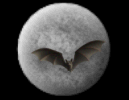|
You remind me of a dog chasing its tail. When it comes to definition, we must start somewhere. About the time I was in the third grade the teacher said it was against the rules to use a word in it's own definition. This comment led me to see that the dictionary had to be fundamentally circular: in any statement, you can replace a word with its complete meaning without losing any content in the meaning of that statement. Clearly, if you tried to do that with the dictionary, you would have to violate the above rule eventually.
Out of curiosity, I went to see how far one had to go in such a procedure before the rule was violated. It turned out that the first word in the dictionary ("a") was defined as "the first letter of the alphabet, a pronoun". That experience set me thinking about the problem of constructing a valid dictionary.
It was clear that if you were very careful to make sure you did not violate that rule, you could (by substituting the explicit definition) reduce the dictionary to a set of words which could be reduced no further without creating a violation. The names you gave to those words was of no real consequence whatsoever; in fact, you could just number them if you wanted to. The definitions of all other words could then be expressed as patterns of those words. The original n words themselves could not possibly be defined; they simply had to be known a-priory. Clearly "a" was one of those basic words as it could not be defined without violating the rule (at the time, I thought the adults knew this). I still think "a" is a rather basic concept.
So, exactly how did we come to know the definitions of these "undefinable" words? I watched the adults with the children and deduced that the meanings of the basic words must be obtained by experience with the real world. Adults either pointed, or explained or attacked the problem in some varied form which could only be characterized by providing the child with an "experience". Clearly there was some relation between the whole of the patterns of words in the spoken language and the real world. Somehow our subconscious was able to unravel that pattern such that we could actually communicate. I certainly could not do it on a conscious level.
This is how I came to conceive of words as no more than tokens for things we both understand as the same. The first thing which becomes clear with such a concept is that words do not have meanings in and of themselves (try to read an old cuneiform tablet) they only have the meanings agreed upon by the communicators. It's all really a secret code and the subconscious mind of a child is the best code breaking device ever conceived (by nature). Every child really learns the meanings of words by guessing and they often guess wrong (that is what makes English a living language; it changes subtly with every generation).
All this to get down to the definition of meaning itself. I hope I have made it clear that all definition is circular in essence. We can start anywhere but when we start, we must begin with concepts that we agree upon and those can only come from our experiences.
So we have here something which was proposed as "true". The assumption was that we all "knew" what concept the word "thought" was attached to and what concept the word "happens" was attached to. If this is where we are to begin then their definitions must be known a-priory. You did not mention "thought" so I will presume you accept also that you and I agree as to the meaning of "thought" (or, if you have evidence that we differ, bring it up). "Happen", in my head, is what thoughts do!! In your head, do they do anything else? (Or do we need to define do? :) )
Have fun -- Dick
|



